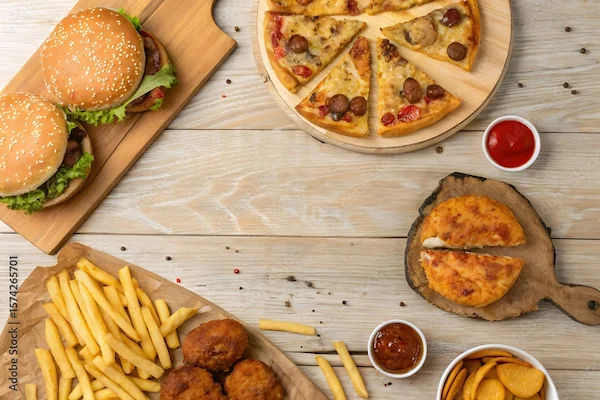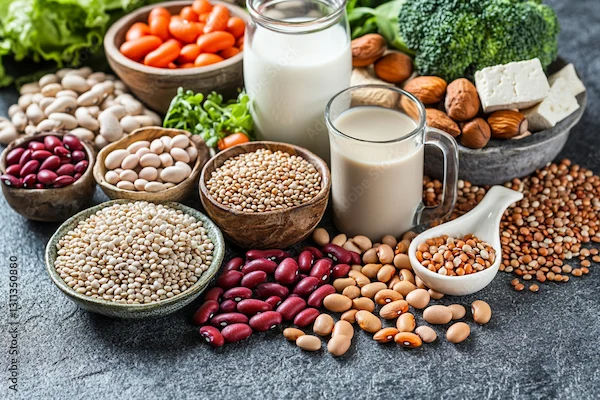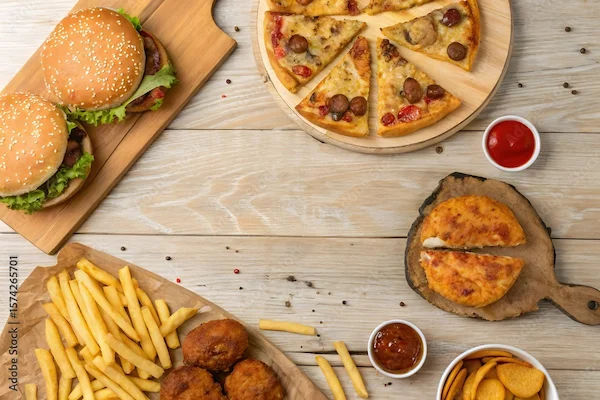Heavy Meals To Satisfy Your Hunger
Explore a variety of hearty, heavy meals designed to satisfy your biggest hunger cravings. From rich stews to protein-packed dishes, find the perfect comfort food to fuel your day.

Written by
Last updated on 21st Jul, 2025

Introduction
Do you often feel the need to eat heavy meals to feel full and satisfied? While indulging in rich, calorie-dense foods can be comforting, it’s important to understand how heavy meals affect your body and what healthier alternatives can keep you full without compromising your health.
What Are Heavy Meals?
Heavy meals typically include foods that are high in calories, fats, carbohydrates, and sugars. These meals may leave you feeling full but can also lead to sluggishness, bloating, and digestive discomfort. Common examples include:
Deep-fried foods (samosa, pakoras, french fries)
Creamy curries and gravies
Large portions of rice, bread, or pasta
Sugary desserts
While occasional indulgence is fine, regularly consuming heavy meals can lead to weight gain, digestive issues, and long-term health problems like diabetes and heart disease.
Why Do We Crave Heavy Meals?
Several factors contribute to cravings for heavy meals:
1. Hunger and Low Energy: Skipping meals or not eating enough protein and fibre can make you crave calorie-dense foods.
2. Emotional Eating: Stress, boredom, or sadness can trigger cravings for comfort foods.
3. Habit: If you’re used to eating large portions, your body expects them.
4. Lack of Nutrients: A diet low in essential nutrients may leave you feeling unsatisfied, leading to overeating.
How Heavy Meals Affect Your Health?
While heavy meals may satisfy hunger temporarily, they can have negative effects:
Digestive Issues: Overeating can cause bloating, gas, and acid reflux.
Weight Gain: Excess calories lead to fat storage, increasing obesity risk.
Energy Slumps: High-carb, high-fat meals can cause blood sugar spikes followed by crashes, making you feel tired.
Long-Term Risks: Frequent heavy meals increase the risk of diabetes, high cholesterol, and heart disease.
Healthy Alternatives to Heavy Meals
You don’t have to give up satisfying meals—just make smarter choices! Here are some nutrient-rich, filling alternatives:
1. High-Protein Meals
Protein keeps you full longer and supports muscle health. Try:
Grilled chicken, fish, or tofu
Lentils, beans, and chickpeas
Eggs or paneer (cottage cheese)
2. Fibre-Rich Foods
Fibre aids digestion and keeps hunger at bay. Include:
Whole grains like brown rice, quinoa and oats
Vegetables like broccoli, spinach and carrots
Fruits like apples, bananas and berries
Consult Top Dietitian For More Healthy Alternatives
3. Healthy Fats
Good fats provide energy without spiking blood sugar. Opt for:
Avocados
Nuts and seeds
Olive oil or ghee in moderation
4. Balanced Portions
Instead of one large meal, try:
Eating smaller, frequent meals
Including protein, fibre, and healthy fats in every meal
Drinking water before meals to prevent overeating
Tips to Avoid Overeating Heavy Meals
1. Eat Slowly: It takes about 20 minutes for your brain to register fullness.
2. Chew Thoroughly: Helps digestion and prevents overeating.
3. Avoid Distractions: Eating while watching TV can lead to mindless overeating.
4. Stay Hydrated: Sometimes thirst is mistaken for hunger.
5. Plan Meals Ahead: Prep healthy snacks to avoid junk food cravings.
When to Seek Help?
If you frequently feel the need to eat heavy meals despite trying healthier options, it may be helpful to consult a nutritionist or doctor. Conditions like hormonal imbalances, stress-related eating, or metabolic issues could be contributing factors.
If you’re struggling with cravings, digestion, or weight management, consider booking a consultation with a nutrition expert on Apollo 24|7. They can help create a meal plan tailored to your needs.
Conclusion
Heavy meals may feel satisfying in the moment, but they can harm your health in the long run. By choosing nutrient-dense, balanced meals, you can stay full, energised, and healthy without discomfort. Small changes in your eating habits can make a big difference—start today!
Would you like help designing a meal plan? Book a consultation now on Apollo 24|7 and take the first step toward healthier eating!
Consult Top Dietitian
Consult Top Dietitian

Ms. Soma Saha
clinical nutrition
17 Years • B.Sc. - Home Science (Food & Nutrition), M.Sc. - Home Science (Food & Nutrition)
Kolkata
Dr Utsa Basu Clinic, Kolkata
(25+ Patients)

Ms. Priyanka Saini
Dietician
9 Years • Msc (Food & Nutrition),NDEP
Ghaziabad
Dr. PRIYANKA SAINI'S CLINIC, Ghaziabad

Ms Silky Mahajan
Dietician
16 Years • B.Sc. - Home Science (Food & Nutrition), M.Sc. - Home Science (Food & Nutrition)
Bengaluru
Foods and Nutrition Clinic, JP Nagar, Bengaluru

Dt Silky Mahajan
Dietician
16 Years • B.Sc. - Home Science (Food & Nutrition), M.Sc. - Home Science (Food & Nutrition)
Bengaluru
Foods and Nutrition Clinic, Koramangala, Bengaluru
(200+ Patients)

Dt Silky Mahajan
Dietician
16 Years • B.Sc. - Home Science (Food & Nutrition), M.Sc. - Home Science (Food & Nutrition)
Bengaluru
Foods and Nutrition Clinic, Whitefield, Bengaluru
Consult Top Dietitian For More Healthy Alternatives

Ms. Soma Saha
clinical nutrition
17 Years • B.Sc. - Home Science (Food & Nutrition), M.Sc. - Home Science (Food & Nutrition)
Kolkata
Dr Utsa Basu Clinic, Kolkata
(25+ Patients)

Ms. Priyanka Saini
Dietician
9 Years • Msc (Food & Nutrition),NDEP
Ghaziabad
Dr. PRIYANKA SAINI'S CLINIC, Ghaziabad

Ms Silky Mahajan
Dietician
16 Years • B.Sc. - Home Science (Food & Nutrition), M.Sc. - Home Science (Food & Nutrition)
Bengaluru
Foods and Nutrition Clinic, JP Nagar, Bengaluru

Dt Silky Mahajan
Dietician
16 Years • B.Sc. - Home Science (Food & Nutrition), M.Sc. - Home Science (Food & Nutrition)
Bengaluru
Foods and Nutrition Clinic, Koramangala, Bengaluru
(200+ Patients)

Dt Silky Mahajan
Dietician
16 Years • B.Sc. - Home Science (Food & Nutrition), M.Sc. - Home Science (Food & Nutrition)
Bengaluru
Foods and Nutrition Clinic, Whitefield, Bengaluru
.webp)


.webp)
